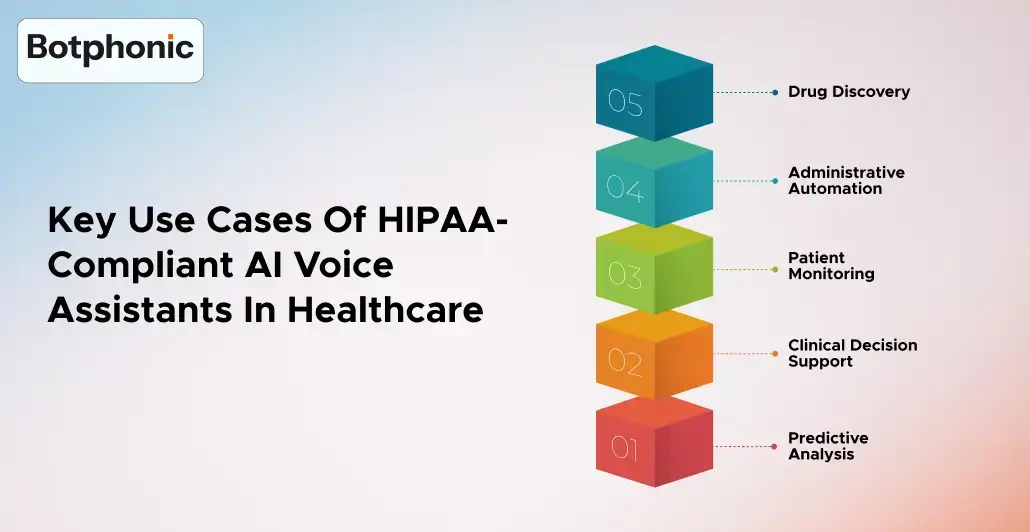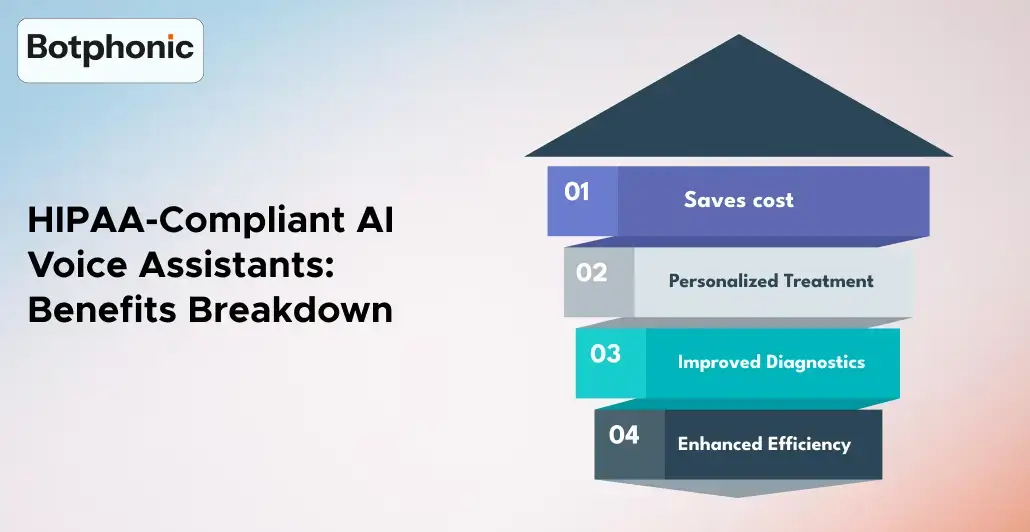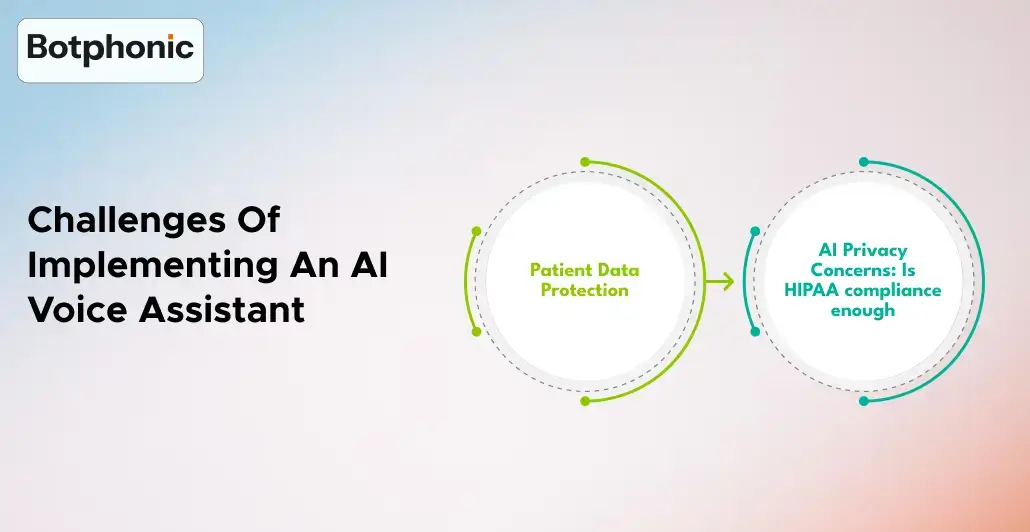
Summarize Content With:
Summary
In the blog, we will learn how HIPAA-compliant AI voice agents play a crucial role in hospitals. Also, we will see how AI voice assistant reduces the workload, conduct smooth operations, and maintain compliance throughout the journey.
Introduction
The practice of healthcare today goes beyond diagnosis and treatment alone. The pressure on doctors is high as they juggle documentation, billing, scheduling appointments, and responding to patient messages. They have a difficult time handling everything.
Additionally, healthcare must adhere to HIPAA compliance in all its aspects. However, it is crucial for doctors to keep the patient data safe.
Too much pressure on doctors!!!
To overcome such stressful scenarios, healthcare should embrace a HIPAA-compliant AI voice assistant in hospitals. Integration of AI voice assistants takes data management, efficiency, and patient interaction to the next level.
But when you integrate an AI call assistant , it is crucial to follow HIPAA regulations simultaneously in the system. If patient data is leaked, patients will lose trust in your services, and you may also encounter legal troubles.
That’s the reason the hospital should deploy a HIPAA-compliant AI voice assistant. These AI virtual assistants are adept at handling patient data securely, whether it is call handling or appointment scheduling.
In short, virtual voice assistants are just like off-site support heroes who are just the extension of your hospital teams. It reduces the workload, conducts smooth operations, and maintains compliance throughout the journey.
Win-win situation!!!
Key Use Cases of HIPAA-compliant AI Voice Assistants in Healthcare

I hope you got the brief idea of the role of AI voice assistance in hospitals. Next, we will see some use cases of digital voice assistants in hospitals.
1. Predictive analysis
Predictive analysis is all about analysing the future health conditions of a patient on the basis of data.
Conversation AI in healthcare can analyze the patient’s gender, age, lifestyle, location, health history, and genomics-like factors and can determine the health conditions and risks in the future.
It helps in early intervention and helps doctors improve the quality of treatment. Smart right???
2. Clinical Decision Support
According to an article in the New York Times, if doctors spent every year researching medical topics, it would take about 13 years to complete it.
Is it practically possible to process such a huge amount of data??? Absolutely no!!!
Here, the power of conversational AI healthcare platforms comes!!!
These healthcare conversational AI tools can easily process a huge amount of data in medical research and fetch out a summary from that and provide doctors, smart and relevant recommendations on patient health status. Basically, doctors will be able to access all the research information without manually conducting the research.
Faster decision!!! Better outcomes!!!
3. Patient monitoring
Nowadays, patients are using smart watches and home medical devices to continuously track their health status, such as glucose level, pulse rate, heart rate, blood pressure, and cholesterol level. Furthermore, it is impossible for patients to manually analyse the data. Here comes the importance of voice assistant AI agents.
These voice AI assistant platforms analyze the patient data in real time and provide them alert if the reading reaches a dangerous level. AI agents analyse the huge amount of patient data and summarise the relevant information to doctors to provide quality and efficient treatment to patient.
Smart monitoring!!! Timely alerts!!! Better care!!!
4. Administrative Automation
Most of the time in clinics and hospitals goes to admin-related work like billing, scheduling appointments, updating records, and on top of handling endless calls from patients like “when I get my claim”?? “ I want to book an appointment on the xyz date”.
It really frustrating!!!
In such stressful scenarios, an AI-powered voice assistant becomes a game-changer for doctors. These AI phone receptionist agents can easily schedule appointments, generate bills, and answer the queries of the patient around the clock. Without the need to wait!!!
Whether you need to refill a prescription or an onboarding patient form, a HIPAA-compliant AI voice assistant can easily automate the workflows of admins and doctors. Thus, voice AI for hospitals saves the huge time and efforts of doctors, helping them to put focus on important tasks like patient care.
In short, you just need to simply say: “Hi!! “Book my appointment.” Your work is done!!!
5. Drug Discovery
Manufacturing new medicine is a slow, time-consuming, and expensive process. But the good news is that an AI voice assistant agent is accelerating the process..
Pharmaceutical companies are leveraging AI voice assistants to summarise medical research papers, scan thousands of chemical compounds, patients’ profiles, and clinical trial data, and even demographic data.
Furthermore, compounds that were previously rejected by laboratories, AI is evaluating them again and suggests which health conditions these compounds are appropriate for.
Just simplify to say: “Hi!! Which potential drugs are appropriate for heart diseases? AI agents will immediately provide you with the details of the drugs.
Amazing and fast!!!
This not only saves your time but also helps you bring life-saving drugs to the market faster. The future of drug discovery is completely AI-powered!!!
HIPAA-Compliant AI Voice Assistants: Benefits Breakdown

I hope you got a deep understanding of the use cases of AI voice assistants for healthcare. Next, we will some interesting benefits of implementing HIPAA-compliant AI voice agents in hospitals.
1. Saves cost
The healthcare industries usually operate on tight margins. Sometimes operating margins are less than 5%, then there is a huge pressure on hospitals to control cost.
In these need hours, conversational AI for healthcare is playing a crucial role. Hippa-compliant AI voice agents automate the complex tasks of billing, medical coding, and insurance reimbursement and reduces the expenses of health care sectors.
So instead of setting up additional teams in hospitals, just say ‘ Hey!! Please process the xyz patient claim.” AI voice agents will handle the entire claim process fast and accurately.
This smart approach reduces the workloads of hospitals, reduces human error, saves costs, and provides high-quality care to patients.
Smart AI = Smart saving!!
2. Personalized Treatment
Nowadays, AI voice assistant are not only smart but also provide a personalized conversation to patients, just like doctors. There is a unique treatment process for every patient, and they deserve a personalized touch at every step of treatment.
Providing personalized conversations to patients makes AI voice agents a super-efficient tool. These AI agents collect data from different sources, like patient history, lab reports, lifestyle info, and even from wearable devices and sensor data.
These AI platforms analyze all the patient data and provide a custom treatment plan to doctors. Doctors further check and approve it.
If the patient’s blood pressure and glucose level reading goes beyond the specified range, doctors will get an alert.
Imagine saying Hi!! How’s Jack BP today?” AI agents provide all the reports of the patient in a few seconds.
Furthermore, HIPAA-compliant AI voice agents coordinate efficiently with doctors and provide them the best treatment suggestions. In this way, patients gets timely care and quality of treatment get improves.
Personalised!! Proactive !! Powerful!!!
3. Improved Diagnostics
Proper diagnosis of health diseases is the most critical aspect of a doctor’s work. AI voice agents are just like right hands for doctors.
These smart platforms can quickly analyze the patient’s history, recent test results, genomic data, and wearable device data. Hippa-compliant AI voice agents also provide relevant summary to the doctors.
Not just that, AI platforms can capture useful insights from X-rays, MRI scans, and CT scans that doctors usually miss.
Doctors just need to say: “Hey!! Please summarise the MRI scan of mr Joe”, AI agents will quickly provide a clear, data-backed overview.
Results? AI platforms provide faster and more accurate diagnoses and help doctors to make better treatment decisions.
4. Enhanced Efficiency
Doctors are giving only 15 minutes to patients, the rest of 15-20 minutes they spend on EHR updates and medical billing. Most of the time, they are busy with updates only.
It’s too tiring and time-consuming!!!
To handle such a stressful and time-consuming process, HIPAA-compliant AI voice agents are a game-changer.
These AI agents automate the EHR entries and treatment coding process, thus the reimbursement process gets faster and efficient without any errors.
Doctors can save their precious time!!
Imagine, doctors just have to say: “Hey!! Update the patient records in the portal.” AI agents smartly listen to the command and enter the patients’ records within a few seconds..
By deploying AI voice assistant technology, doctors can give more time to patients and make better clinical decisions.
Less paperwork!! More patient care!!!
Challenges of Implementing an AI Voice Assistant.

I hope you got a clear understanding of AI voice agents’ benefits. Next, I will talk about a few challenges of implementing it.
1. Patient Data Protection
In today’s world, AI call agents can not only answer calls but also handle appointments, sensitive health information, and patient queries. That’s why HIPAA Compliance is a crucial aspect of hospitals.
The first step, AI agents should be trained on PHI (Protected Health Information) to secure patient data. AI agents should be trained on encryption protocols and security protocols to protect the data from unauthorised data.
2. AI Privacy Concerns: Is HIPAA compliance enough?
AI phone call agents and chatbots are helpful to healthcare organisations. But implementing HIPAA-compliant AI voice agents is not as simple as it seems.
According to experts from Harvard Law School, HIPAA is an outdated practice and is unable to address the new privacy issues of AI platforms.
They argue that AI agents require legal and ethical frameworks that are more advanced than currently available frameworks.
An AI model needs to be trained on quality data to prevent biased results and to ensure the security of patient data remains intact.
Conclusion
AI call agents have the full potential to transform healthcare organisations. But only if you train your AI models on HIPAA regulations.
Many of the best AI assistant platforms, including Botphonic, already comply with HIPAA.
But this is just a starting point. Industries should constantly put efforts to align the AI technology with the evolving data privacy laws.
I hope the above blog provides you with valuable insights on HIPAA-compliant AI voice agents. Connect with Botphonic to know more!!!!!

